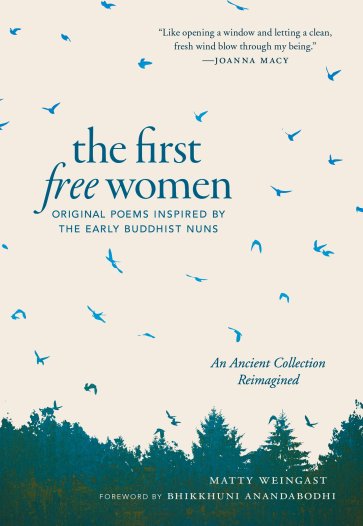The foreword of The First Free Women: Original Poetry Inspired by the Early Buddhist Nuns begins with senior nun Bhikkhuni Anandabodhi declaring, “These poems you hold in your hands are like jewels to me. They call us to remember our greatest potential—our potential to be free.” The poems in question are interpretations of those found in the Therigatha, or “Verses of the Elder Nuns,” the sacred text in the Pali canon written over two millennia ago by and about some of the first Buddhist women. In addition to calling upon our capacity for freedom, the poems are personal, evocative, and at times even comedic. They offer insight into the daily thoughts and lives of these early nuns, as well as the lives they lived before.
Though many translations of the Therigatha exist, Matty Weingast penned a recent interpretation of the poems that expands on the Pali text for renditions that resonate deeply today. In a review of The First Free Women: Original Poetry Inspired by the Early Buddhist Nuns for Tricycle, Dan Zigmond wrote,
Weingast’s poems. . . are more reimaginings than they are direct translations, and at times he takes considerable liberties with the Pali sources. For this reason, it can be jarring to compare his versions to the earlier editions. And yet the nuns’ voices, not his own, are what shine through. It is as if he has brought these wise women back to life, conjuring the poems they might have written if they were walking among us today.
Due to concerns that the original presentation of this book may have given the false impression that it consisted of literal translations of the Therigatha, Shambhala Publications released a second edition with a revised title, The First Free Women: Original Poetry Inspired by the Early Buddhist Nuns, in June 2021. (Learn more here.)
Below is a selection of poems from the collection:
***
Sumana ~ Flowering Jasmine
Walk through
the mind
all day
and
all night.
When you find
each thought
ending
right
where
it began—
here your circling ends.
Sangha ~ Community
When I left the only home I’d ever known,
I thought I’d left everything behind.
But I was still carrying
all the years
of running
back and forth
and around in circles
after this or that.
Just sitting still,
those circles
have broken apart
and been carried away
by this simple wind
blowing in
and out.
All your old thoughts like snow
falling
on
warm
ground.
Just sit back and watch.
Another Uttama*
The entire Path,
and all you will ever need
to walk it,
you will find inside.
So the Buddha taught me.
Once I took a closer look,
all the running around
started to seem a little silly.
Things changed so quickly—
by the time I got anywhere,
I’d be someone else.
You are your mother.
You are your daughter.
One
moment
gives birth
to the
next.
What we do is who we become.
(*Uttama is another Pali word for theri, which means elder and is used to refer to senior nuns.)
Soma ~ Happiness
He said:
How could a woman,
who knows no more than how to cook,
clean, and make babies,
possibly reach the further shore—
on the way to which so many good men
have drowned or turned back?
I said:
The mind is neither male nor female.
When directed towards the arising
and passing away
of all things,
it easily penetrates
this mass of darkness.
Be serious.
What’s a few inches of meat
compared to the immeasurable reaches
of the liberated mind?
Mahapajapati ~ Protector of Children
I know you all.
I have been your mother,
your son,
your father,
your daughter.
You see me now in my final role—
kindly grandmother.
It’s a fine part to go out on.
You might have heard
how it all began—
when my sister died
and I took her newborn son
to raise as my own.
People still ask,
Did you know then what he would become?
What can I say?
What mother doesn’t see a Buddha in her child?
He was such a quiet boy.
The first time he reached for me.
The first time I held him while he slept.
How could I not know?
To care for all children
without exception
as though each
will someday
be the one
to show
us all
the
way
home.
This is the Path.
From The First Free Women: Original Poems Inspired by the Early Buddhist Nuns by Matty Weingast © 2020 by Matty Weingast. Reprinted in arrangement with Shambhala Publications, Inc. Boulder, CO.
